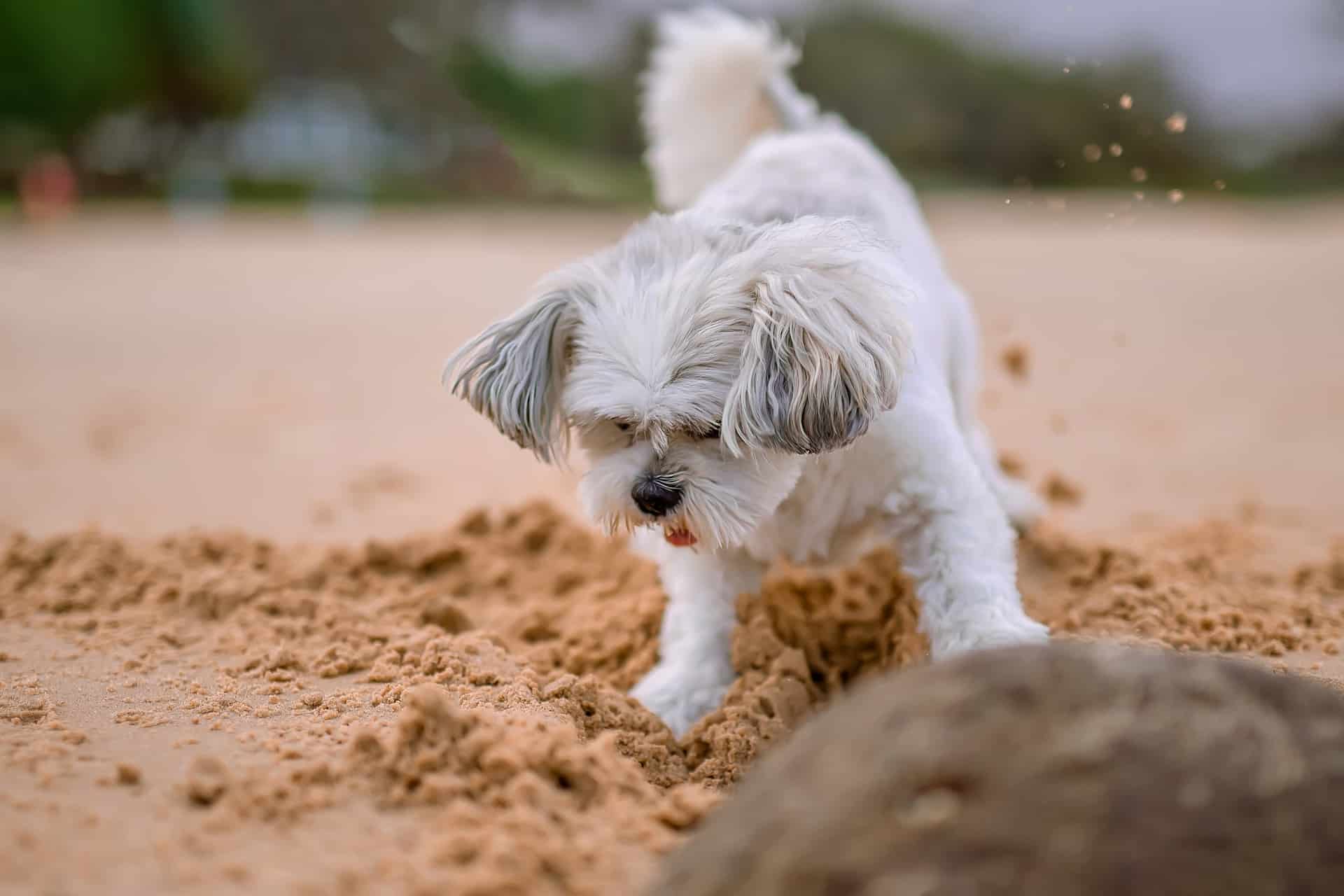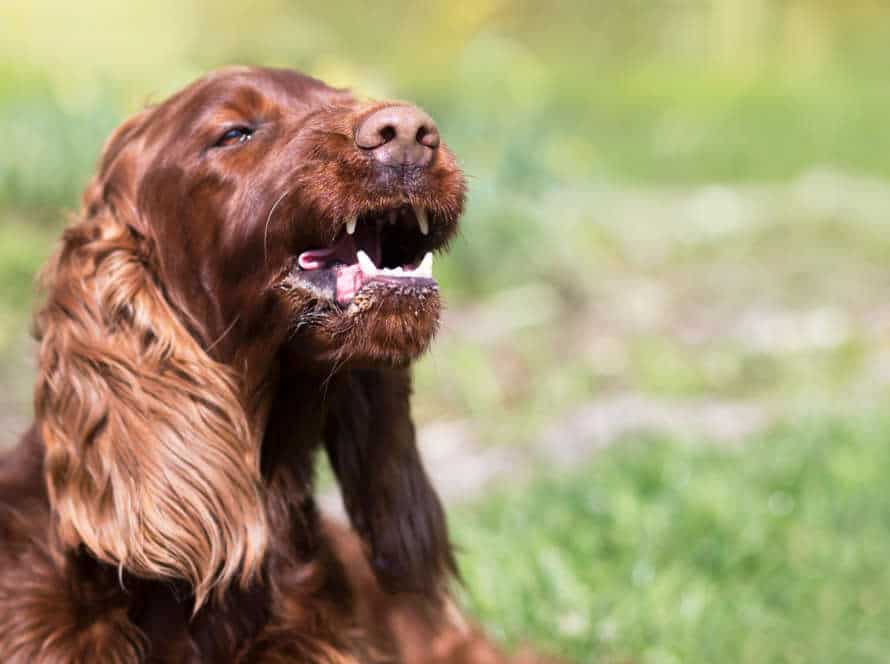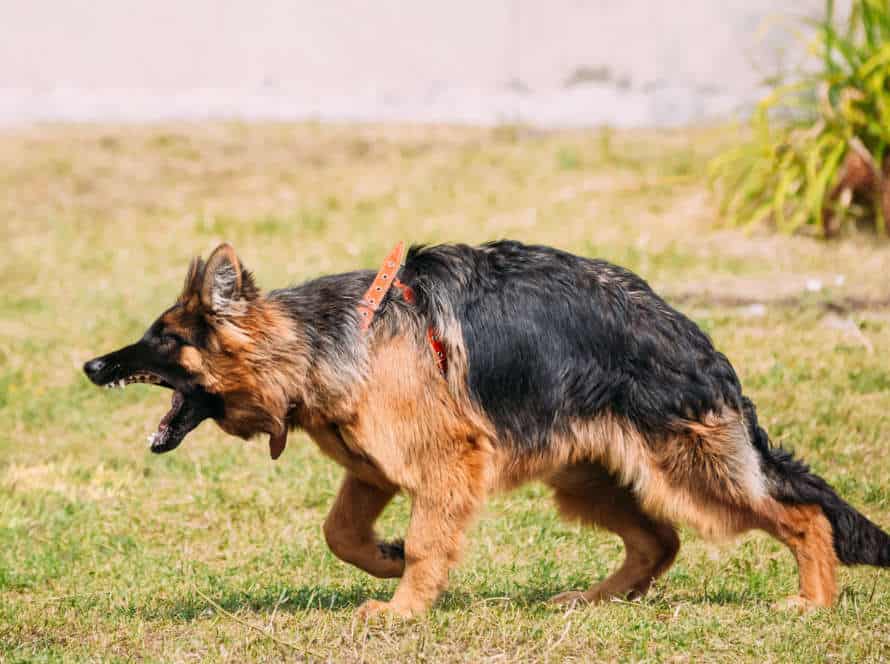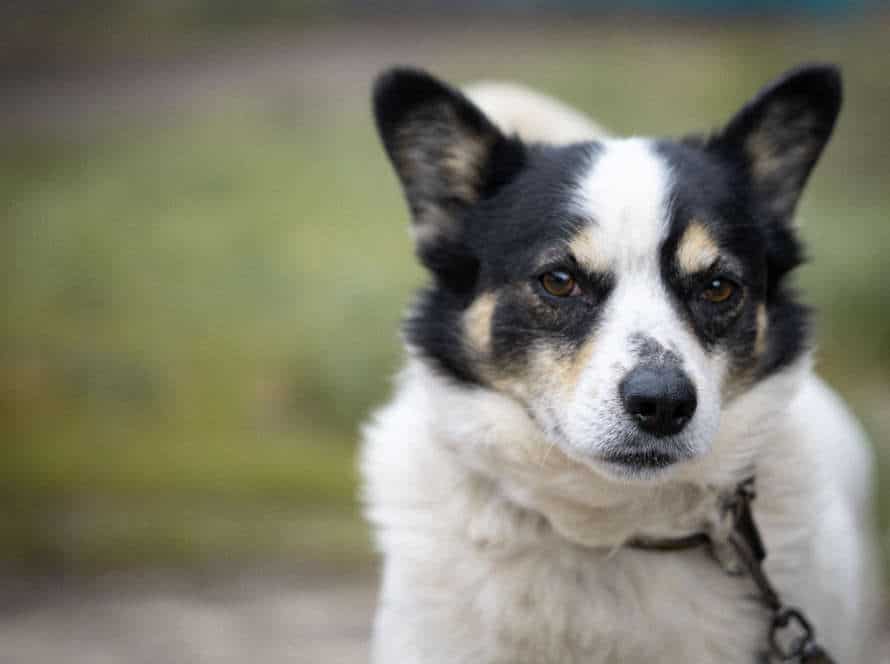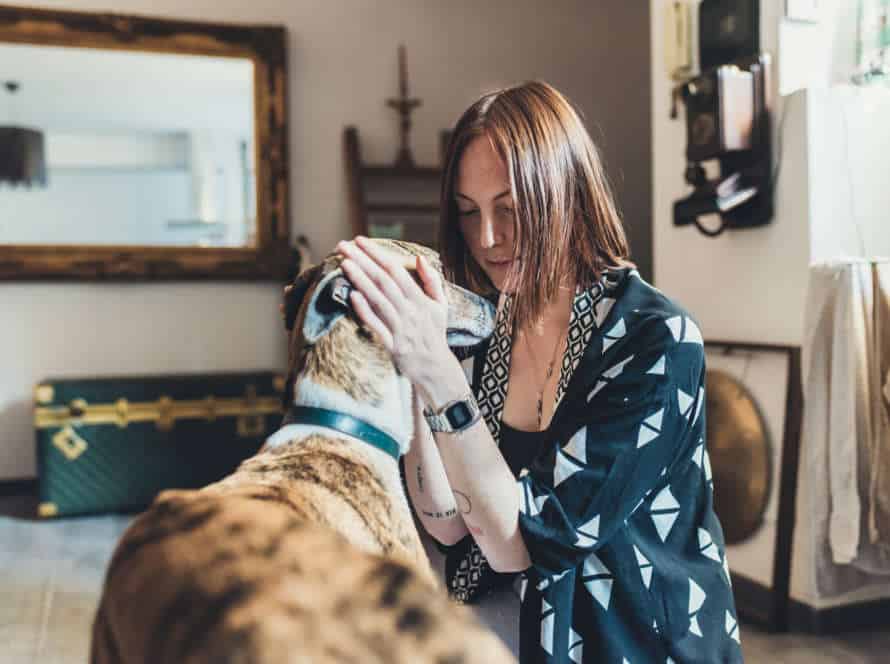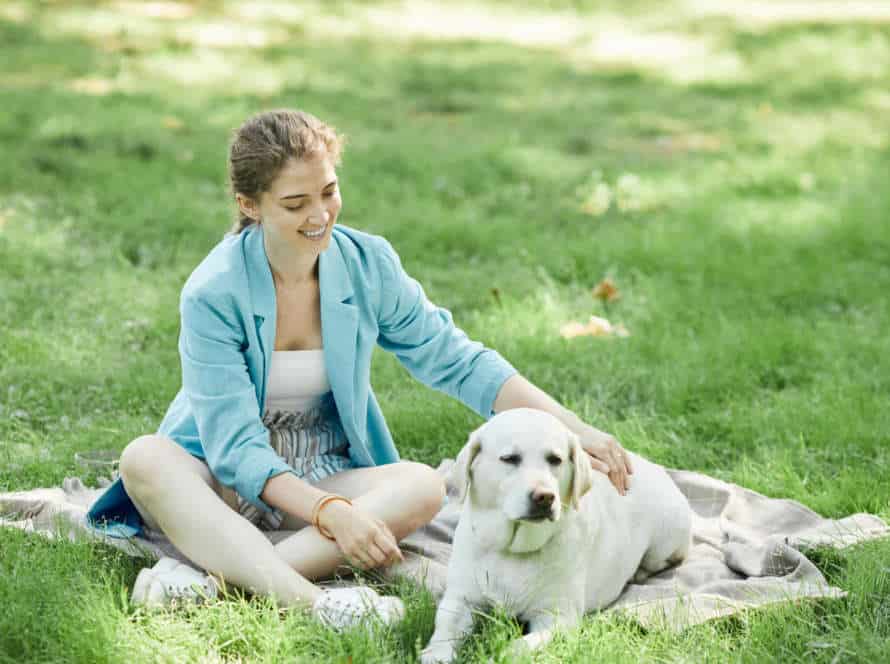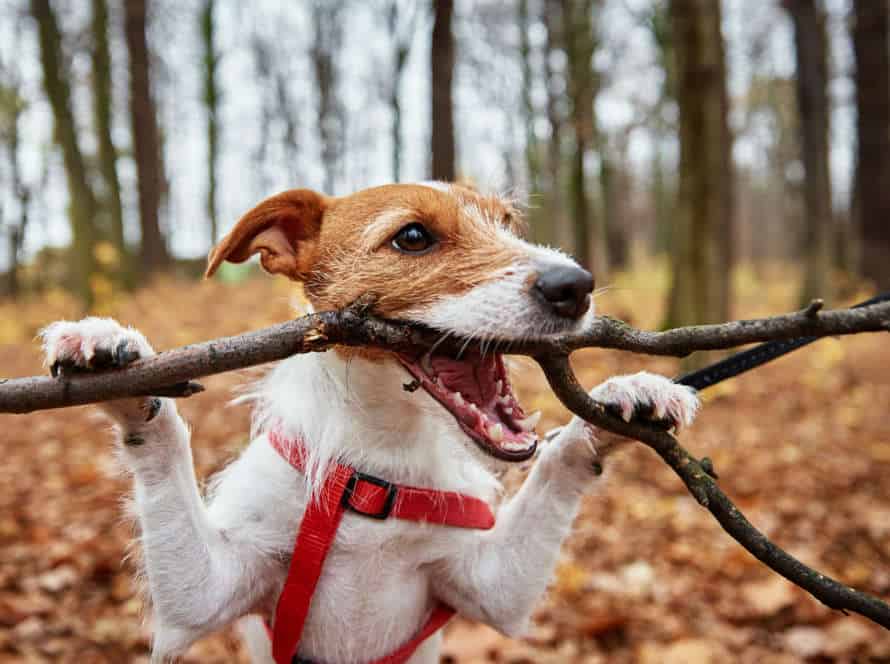How to Handle Digging Behavior in Puppies
Digging is a natural instinct for puppies. But, it can be hard to manage. Here’s how you can help:
- Give alternatives. Offer plenty of toys and chews. Long walks and games of fetch can tire them out.
- Reward good behavior. Give treats and praises when your pup doesn’t dig in places they shouldn’t.
- Designate a spot. Choose somewhere in the yard where digging is allowed. Then, encourage them to dig there.
- Supervise. Keep an eye on them to make sure they don’t dig where they shouldn’t.
- No punishment. Don’t confuse or scare them with punishment. Instead, redirect them and give alternatives.
Remember: Patience and consistency are key. With proper training and positive reinforcement, you can help them learn good habits that will last.
Understanding Why Puppies Dig
Dogs dig for many motives. It can be wanting attention or just exploring. It’s normal for pups.
To understand why, it’s key to look into the main reasons and figure out solutions.
Reasons behind digging behavior in puppies
Puppies dig for many reasons; some are behavioral and others are instinctive. Knowing why puppy’s dig is very important for controlling and avoiding destructive digging. These are the usual causes of puppy digging:
- Boredom: Digging is a way to keep puppies amused and relieves their boredom. Give them lots of toys and playtime for mental stimulation.
- Territory: They may dig to claim their area. Give them a special area where they can dig.
- Comfort: Puppies may dig to make cool places to lie down in hot weather. Give them shaded areas to relax.
- Hunting: Puppies may naturally dig looking for food or prey. Prevent this by giving enough food and no rodents around.
Knowing your pup’s habits and giving them the right attention, toys, and care can stop destructive digging.
Recognizing specific breeds prone to digging
Digging is a common activity in puppies. It can be caused by various factors. Certain breeds are more likely to dig. Knowing these breeds and their instincts can assist in preventing and managing their digging behavior.
Dachshunds: They are genetically wired to burrow and hunt badgers.
Jack Russell Terriers: Inquisitive and energetic, they investigate and explore their surroundings, which leads to digging.
Beagles: High sense of smell and energy make them search for scents, resulting in digging.
Siberian Huskies: The cold-weather breed has a high prey drive and abundant energy, causing them to dig and escape yards.
Australian Shepherds: Intelligence and activity levels require mental and physical stimulation, which may lead to destructive digging.
Pro tip: Exercise, mental stimulation, and a designated spot to dig can help prevent and manage digging in puppies.
Identifying signs that your puppy is starting to dig
Digging is a common puppy behavior; but, it can get destructive if not taken care of. Signs your pup is starting to dig:
- They spend a lot of time in one area, and you see holes or disturbed soil.
- They come inside with dirty paws or a muddy snout.
- They are restless or bored and start to dig for fun.
To manage the digging, give your pup plenty of exercise and mental stimulation. Set up a sandbox for them to dig in, and show them that’s the place to do it. Be consistent with positive reinforcement and keep redirecting them to the designated area. With patience and effort, you can train them to stop their digging habits.
Positive Solutions for Managing Digging
Digging is a natural thing for puppies. It’s one of the few activities they can do that are actually enjoyable. So it’s important to find good solutions for dealing with their digging behavior. Let’s look at ways to manage it and make it a fun experience for the pup.
Provide your puppy with designated digging spots
Digging is a natural behavior for puppies. You can help redirect this behavior and save your garden or yard by providing designated digging spots. Here are some tips:
- Choose an area in your yard for your puppy to dig.
- Bury toys, treats, or bones in the spot.
- Encourage them to use it. Praise and reward them when they do.
- Redirect them to the spot if they start digging somewhere else.
- Be consistent. With patience and training, your puppy will learn to use the designated digging spot. Then you can enjoy a beautiful garden or yard!
Bury toys and treats in your puppy’s designated digging spots
Designate areas in your yard where it’s ok for your pup to dig.
- Bury toys and treats in those areas to encourage digging there.
- Praise and reward your pup when they use the designated digging spots.
- Redirect them to those spots if they’re digging elsewhere.
- Provide a digging pit with sand or dirt for extra digging fun.
- Always supervise your pup when they’re digging and never punish them.
Train your puppy to redirect their digging behavior using commands
Training your pup to stop digging where they shouldn’t? Use commands! It’s an effective and positive way. Here’s how:
-
Choose a spot in the yard for your pup to dig. Maybe a sandbox, or an area of soil.
-
When you spot them digging in the wrong place, calmly redirect with a command like “dig here” or “go to your digging spot“.
-
Reward when they follow your command, with praise or a treat.
-
If they don’t, make a loud noise, and direct them to the right spot.
-
Be consistent, reinforce positive behaviors and redirect the negative ones every time.
-
It’s natural for dogs to dig, so provide an approved spot, and teach them to redirect their digging in a positive way.
Negative Solutions to Avoid
Puppies are born diggers! This can become a problem if it’s not corrected. To train them, it’s essential to take action fast. But, don’t use punishing solutions – that’s a ‘no-no’! Here’s a few things to avoid when dealing with puppy digging:
Punishing your puppy for digging behavior
Punishing your pup for digging isn’t the best way to stop it. It can make them scared, anxious, or aggressive. Here are some things to avoid and tips for stopping digging:
- Don’t yell or hit them. It’ll ruin trust.
- Don’t keep them in one spot or alone – it’ll make the behavior worse.
- Don’t use hot water or spray them. It could be traumatizing.
- Help them use their energy – give them toys, train them, and exercise.
- Give them a special spot in the yard to dig – use a barrier.
To fix the problem, find out why they’re digging. Maybe they’re bored or anxious. Give positive reinforcement and be understanding. Pro tip: Patience, positivity, and persistence will help you correct bad behavior.
Using chemical deterrents to prevent digging
Chemical deterrents to prevent puppies from digging should be avoided. This method is not a good solution and can be harmful for your pup’s health. Here are some reasons why:
- Chemicals can be toxic to puppies and other animals.
- It doesn’t teach the pup proper digging behavior and the problem may continue.
- Some chemicals only provide temporary relief, needing frequent reapplication.
Rather than use chemicals, try redirecting the pup’s behavior. Provide a designated digging area and engage in playing, exercising, and mental stimulation with chew toys and puzzles. Positive reinforcement training can also teach desired behavior and help stop unwanted digging.
Leaving your puppy unattended for long periods of time
Leaving your pup alone for too long isn’t a good idea – it can cause behavior issues, including digging. Giving them mental and physical stimulation is essential to avoid bad solutions that can harm or disturb your pup.
Here’s what to avoid, and how to handle their digging:
- Don’t punish them for it; it can make them scared and anxious.
- Don’t leave them outside alone for long periods.
- Don’t yell or scold them; it can cause aggression and fear.
- Redirect their behavior with toys, chew bones, and quality time.
- Create a digging area with sand or soil.
Pro Tip: Consistency, patience, and positive reinforcement are key to stop digging!
Tips for Success in Managing Digging Behavior
Tackling digging habits in puppies can be difficult. But, with the correct methods, we can show puppies better behavior!
Here are some tips and tricks to master puppy-digging-management:
Consistency is key
Consistency is the answer when managing digging behaviour in puppies. Inconsistent treatment confuses pups and hampers their progress. Follow these ideas for consistency in handling puppy digging:
- Set clear boundaries and rules from the start & be consistent.
- Use positive reinforcement to reward correct behaviour & discourage digging in undesired places.
- Give your pup lots of activity and brain stimulation to avoid boredom which could lead to digging.
- Be patient, consistent in training, rewarding good behaviour & redirecting inappropriate behaviour.
Note: Creating a consistent routine and training plan is vital for success when dealing with digging behaviour in puppies. Pro tip: Never punish or scold them for digging – it can cause fear and anxiety and worsen the behaviour.
Avoid getting frustrated with your puppy’s progress
Digging is a natural behavior of puppies and managing it can be tricky. But, with a few tips, you can avoid getting mad and manage their digging.
- Redirect their behavior. Give them a digging spot where they can dig safely. Praise them when they go to their digging spot and take them there whenever they start digging in unwanted areas.
- Supervise your puppy during outdoor playtime, especially in the early days. Use a leash for teaching them outside and if they start digging in the wrong place, redirect their attention.
- Provide lots of mental stimulation and physical exercise for your puppy, so they won’t be bored and start digging.
- Remember, puppy training takes time and patience, so stay positive when redirecting their behavior.
Pro tip: Consistency, perseverance, and redirection are the keys. Always stay positive and praise good behavior to reinforce it.
Seek professional help if digging behavior becomes excessive or dangerous
Digging is a common behavior in puppies. But if it gets too much, it can become dangerous. So, some digging is normal. If it’s destructive or harmful, get help from a pro.
Here are tips to manage digging:
- Exercise and give mental stimulation to reduce boredom.
- Redirect to a designated digging area with sandbox or soil.
- Reward good behavior and discourage bad behavior with positive reinforcement training.
- Pro help is needed if digging persists or becomes harmful. This can put the puppy in danger, so get pro help. It can make a real difference.
Frequently Asked Questions
Q: Why do puppies dig?
A: Digging is a natural behavior for dogs, especially puppies. They may dig to find food, bury a bone or toy, escape or create a cool place to rest in warm weather.
Q: How can I prevent my puppy from digging?
A: Provide your puppy with plenty of exercise, toys and attention to prevent boredom. You can also create a designated digging area filled with sand or soil, and train your puppy to dig only in that area.
Q: What should I do if I catch my puppy digging in the wrong place?
A: Avoid punishing your puppy as it may be ineffective and cause fear. Instead, redirect their digging behavior to a designated digging area and reward them when they dig in the right place.
Q: Can digging behavior be a sign of something more serious?
A: Yes, excessive digging or digging in unusual areas may be a sign of anxiety, stress or boredom. Consult with your veterinarian or a dog behaviorist if you suspect a deeper issue.
Q: Will neutering or spaying my puppy eliminate digging behavior?
A: While neutering or spaying may decrease some natural urges in dogs, it is not a guarantee that your puppy will stop digging. Training and proper management are the most effective ways to handle digging behavior.
Q: How long does it take to train my puppy not to dig?
A: Every puppy is different, but consistency and patience are key in training. It may take several weeks or months for your puppy to learn not to dig in certain areas, but with positive reinforcement and consistency, they will eventually learn the appropriate behavior.

